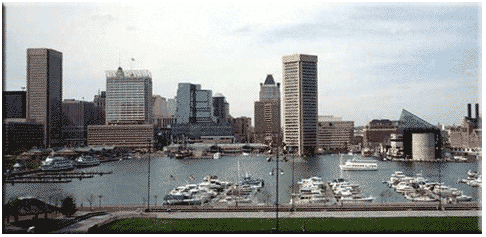History of Baltimore, Maryland

Appalachian Range that protects the city from much of the winter cold that would otherwise freeze the harbor.
The present city was incorporated on July 30, 1729, and was named after Lord Baltimore, along with several other ports on the upper edge of
Chesapeake Bay. Prior to colonists, many Native American tribes inhabited the land, but withdrew before it was settled by Europeans.
The most famous period in Baltimore’s history was during the
War of 1812 when the city was condemned by the British as a “nest of pirates.” Staunchly anti-British sentiment pervaded the streets of Baltimore just days after the War of 1812 ignited, making it a worthy target for the enemy. The
Battle of Baltimore was decisively won by the colonists on September 13, 1814, when they repulsed a land and naval attack by the British at
Fort McHenry following the redcoat torching of
Washington, D.C. An angry mob destroyed the building where a
Federalist newspaper criticized the colonies for going to war.
As a southern slave state prior to the
Civil War, Maryland later became part of the Union, but kept slavery legal. Most persons in Baltimore at the time were sympathetic to the
Confederacy. The Baltimore Riot of 1861 was sparked when Union soldiers stormed the streets looking for
Confederate sympathizers. Troops remained in Baltimore until the war ended in April 1865, partly to prevent the state from seceding. The strategy was to prevent the full encroachment of Confederate states around Washington, D.C.
Directly after the Great Baltimore fire of February 7, 1904, Mayor Robert McLane spoke of the help offered to rebuild the city where more than 1,500 buildings had burned in just 30 hours. McLane was quoted in the
Baltimore News as stating, “To suppose that the spirit of our people will not rise to the occasion is to suppose that our people are not genuine Americans. We shall make the fire of 1904 a landmark not of decline, but of progress.” In September 1906, two years after McLane had refused assistance, the
Baltimore-American reported that the city had risen from the ashes and “One of the great disasters of modern time had been converted into a blessing.”
Known as a city of monuments, Baltimore is home to the first architectural monument in honor of
George Washington, which stands at 178 feet. The
Washington Monument in Washington, D.C., was modeled after the Baltimore version, which was erected in 1829. The
Battle Monument of the War of 1812 stands as in memory of the Battle of Baltimore, which inspired the poem for the lyrics to the National Anthem,
The Star-Spangled Banner by Francis Scott Key.
Baltimore is home to many such interesting and innovative attractions as the Baltimore World Trade Center, which is the world’s tallest equilateral, five-sided building; and the Pimlico Race Course, is the site of the Preakness Stakes. The second leg of the Triple Crown of Thoroughbred Racing, the Preakness, began in 1873.
Beginning in the 1970s, efforts were made to revitalize Baltimore’s Inner Harbor with the Baltimore Convention Center that opened in 1979 and Harborplace, a modern urban retail and restaurant complex, was opened in 1980. It was followed by Maryland's largest tourist destination, the
National Aquarium in Baltimore, in 1981. The Baltimore Orioles of Major League Baseball moved from Memorial Stadium to Oriole Park at Camden Yards downtown, in 1992.
Babe Ruth was spotted by Jack Dunn, owner of the Baltimore Orioles of the International League, who signed him to his first professional contract at age 19 in Baltimore. In other sports-related events, the Baltimore Ravens of the National Football League moved next door into the newly renamed M&T Bank Stadium in 1998.
Museums in Baltimore include the
Baltimore & Ohio Railroad Museum and the Baltimore Museum of Art. The city also boasts the
Baltimore Basilica, which is the first church constructed in United States following adoption of the new
Constitution. Institutions of higher learning include the University of Maryland, Baltimore County.
